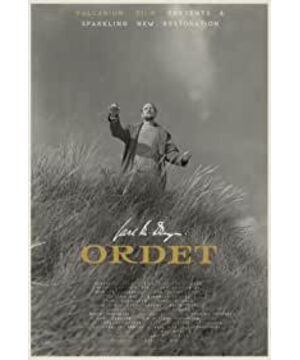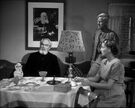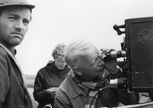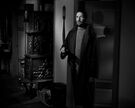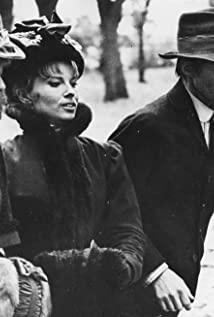This theme, for Bergman, is the excitement in people's souls after losing their faith; for Antonioni, it is a modern man wandering back and forth in the ruins of post-industrial society; for Bresson, it is The transcendental experience brought about by the film’s style and style; for Dreyer, it is human arrogance that gradually erode the faith and gradually turn the religion that promotes love into struggle and persecution.
The decline of Christianity is an indisputable fact in Western society since the Reformation. On the one hand, this decline is manifested in philosophy as the philosophization, psychology, and experience of religion; on the other hand, in daily life, people generally lack faith and loyalty to God. Faith has become a satisfying enjoyment of secular life for modern people. In the words of Bogan Farmer in "The Promise", "I only pray when I feel valuable." In the Western philosophical and theological circles, the call for the return to the original Christian faith is also heard from time to time. In the distance, there is the "Christian passion" called by Dreyer’s Danish compatriot Kierkegaard. Orthodox theology. The former, through criticism of modern Christianity, demanded to return to the original Christian faith that was full of flesh and blood, vitality and passion; the latter once again established Christianity on historically revealed truths. Both of these can be regarded as a distant echo of Paul's theology in the modern world. The apostle Paul’s faith is based on the resurrection of Jesus. The miracle of resurrection because of Christ’s death shows that Jesus the Savior is the only Lord we trust. The core of people's belief and behavior is love. Love entrusts oneself as a whole. Only through love can people have faith in faith and the possibility of salvation.
From Pasolini’s "Gospel of Matthew" to Mel Gibson's "The Passion of the Christ", the themes of Christianity in the film can be said to be endless, but in the sense of Paul's theology, I have only called people to return to the original Christian faith. See Dreyer's "The Promise".
"The Promise" tells the story of how two families whose children who love each other could not be united due to inconsistent beliefs returned to good results due to a miracle. Bogen farmer Mort Bogen has three sons. The eldest son Mickel is kind and hardworking, but he does not believe in God. His wife Inge is a devout Christian and has an important influence in the whole family. The second son, Johannes, gradually "developed internally" because of his study of theology, and became insane. He claimed to be the Christ of Nazareth, repeating some gospel words at home all day long. His face and expression are exactly like the Christ that people see in the icon. The third son Anders and Anne, the daughter of Peter the tailor, fall in love, but they are thwarted by two families with different beliefs. In the end, Miguel's wife Inge died in a dystocia. Johannes left a gospel message and disappeared. The whole family fell into deep grief. At Yingge's funeral, Johannes suddenly appeared. He had regained his sanity. Under the prayers of his and Ying's daughter, Yingge came back from the dead and once again awakened the faith of everyone present with a miracle.
It is not so much about miracles in the movie as it is about the truth of faith. Through the miraculous spectacle created by the movie, Dreyer calls for a faith that is truly visible (as Johannes often said in the movie "I see..."), a kind of faith that really dares to pray for the resurrection of the dead Belief.
The miracle of Jesus resurrecting the dead appears many times in the gospels, and there are also biblical illustrations of Jesus resurrecting the dead in the movie. Obviously, "Promise" intends to reproduce this story. In movies, miracles have always been a topic of repeated discussion. Those who lack loyalty to their beliefs think that "the era of miracles is over", "the miracles will never happen again" or "the miracle of Jesus is the exception", Dreyer The pastor in the film talked about the interpretation of miracles by orthodox theological doctrines, "The miracles of nature are normal, because God is the creator of all things, and all things are possible for him. On the other hand, God can perform miracles. He did not do it, why not? Because miracles will break the laws of nature. Of course, God will not break his own laws. "If you want to reconcile faith and reason, you have to adopt this Spinoza-style philosophical interpretation of miracles. The belief in miracles is even more severely rejected by modern science. The doctor in the film turned the pregnant woman into peace (she died unknowingly) and said to the farmer, “Whose credit do you think is the miracle tonight? Prayer or my medical skills?"
Just as important as miracles is love, which is mentioned many times in the movie. There is a conversation between Inger and Morte about love:
"Grandpa, I think the most important thing is to love each other"
"Love has a limit, Inger"
...
"Grandpa, can you tell me that you really loved each other in this life?" ? " "
I loved about 10 times. " "
ah, my grandfather, it seems you never really loved my little grandfather, in this world, you know everything, except love. "
movie, Mike Er deep Loves his wife Inge, but Mikol doesn't believe in God. Inge said to him, "You are very kind, but being kind is not enough." Only good people based on secular love and rationality are vulnerable, especially when fate strikes.
The focus of the film’s performance is how the belief in unbelief in miracles and lack of love is corrupted in the face of human arrogance, and how belief has become a battle or even persecution (Here, Delaier continues from "Joan of Arc" to " The theme in "Days of Wrath"), which is reflected in the opposition of beliefs between the farmer Bogen and the farmers represented by Peter. They all claim that their beliefs are true beliefs, but they can hardly conceal the emptiness of their beliefs, so they can only fill it with arrogance. Mott disagrees with the marriage between his son Anders and the tailor's daughter Anne, which is explained by Micole, "You are worried that Anders' faith is not as strong as Anne's!" In case the son is affected by Anne's It was a shameful thing for Morte to change his letter. How could a proud farmer lose to those farmers. The reason why Peter the tailor rejected Anders is ostensibly because of his different beliefs, but in fact it is his inner pride. What he thinks in his heart is "If we little people can defeat the Bogan farmer, that would be a very good thing." . Later, Morte knew that his son's proposal was rejected, and unexpectedly brought Anders to propose again, also because of inner pride, "What? My son of the farmer of Bogan, can't he still marry that tailor's daughter" ? For Mott and Peter, faith has become a war of honor. A scene in the movie cleverly shows how the original unity of Christianity was split under people’s pride and conceit: Morte brought Anders to Peter’s house again to propose marriage, and he was encountering "that nasty group" Farmers" are holding a prayer meeting. Finally, when the prayer meeting was about to end, people began to sing hymns. At this time, the camera fixed the lens on the model and his son. It is clear that they believe in the same God, and the hymn praises the same God. At this time, Morte’s face is full of rigid, uneasy and dismissive expressions, forming a strong irony with the surrounding sacred hymn music. . What’s more interesting is the next scene. Peter tries to make Morte "turn to their side." He grabbed Morte’s shoulders with both hands and said something that only our faith can make him saved, and Morte has a backward slant. The instinctive resistance action of turning around is very similar to the action of people resisting the temptation of the devil in some religious paintings: when faith is occupied by inner arrogance, people become the devil. In the next scene, this is even more proven: Before Mort left, Mikol called and told Yingge that she was critically dystocia. Peter hoped that this fact would prove to Mort that his faith was unreliable, and he "hoped in the name of Jesus" that Inge would die in this dystocia. Faith and persecution through faith, angels and demons, in people’s hearts
Johannes is a key figure in the movie, and his multiple identities make him look blurred. First of all, he is a seminary student with psychopathological symptoms. He thinks of himself as Jesus and talks nonsense all day long, but he is also a loyal man with true faith like Inge. When the movie ends, he regains his sense. It can be seen that his belief is not based on insanity. To some extent, Johannes is similar to the holy folly in Russian culture. In the end, in terms of characters, styles or plot arrangements, Johannes does have the shadow of Jesus. After Inge died, he left a gospel message and disappeared:
"The time I was with you was short,
you will find me where
I went, you can't go"
He mysteriously disappeared, which is equivalent to some form of death. All the transfers and miracles happened after his "death", including the tailor Peter who suddenly realized the futility of his beliefs and came to Mott to reconcile; and also included the resurrection of English later. The film deliberately symbolizes the story of Jesus' death on the cross and his resurrection three days later through the "death" of Johannes and his later resurrection (returning to his sanity). It is through the double miracle of Jesus' crucifixion and resurrection and the resurrection of the dead by Jesus that Dreyer sends people's call to return to the original Christian faith.
Making a movie about miracles is not a pleasing thing, and the audience can easily arouse resentment. Although the miracles in many movies have something to do with faith, people always feel that there is something wrong with the director's narrative, and they can't round the scene, so they have to use the miracle to save the scene. For example, "Ben Xu" gives people this feeling. When Dreyer dealt with it, he regarded miracles as an inevitable result of the film's narrative, and he made sufficient preparations beforehand, and at the same time laid a solid foundation in the audience's mind with the help of the "prototypical narrative" of miracles in the "Bible". In terms of visual language, Dreyer fully demonstrated the contrast between before and after the miracle occurred, thereby strengthening the persuasive power of the miracle. In the outdoor scenes in the first half of the movie, the sky is always dark and unclear. Far from the road where the carriage drove, a piece of hillside was full of weeds dancing in the wind, and a small gray cross stood in the distance, symbolizing the decline of the impression. After Johannes left (symbolizing the return of faith after the death of Christ), the outdoor sky began to brighten. This effect of light was also applied to the scene where the miracle happened. In the spiritual room, the strong sunlight outside the window passed through the curtain and fell on the coffin of Yingge. This light has rich connotations. In the history of Christian theology, Augustine's Illuminati theology has a great influence. The eternal light of God shines on the limited reason of man, and only people can believe in it. Inge is also a firm believer like Johannes. Her images after death did not feel dim at all, but were bathed in a piece of holy light, as if she was really in the embrace of God, her next The resurrection also seems natural.
————————————————
Personal public account: Jashua
is updating India travel diary on the road , welcome to pay attention!
View more about Ordet reviews


